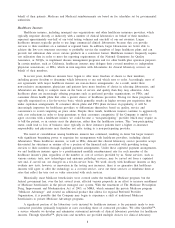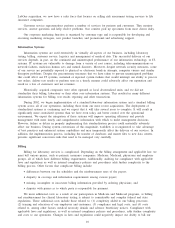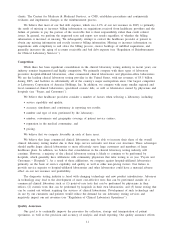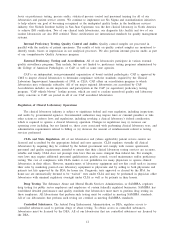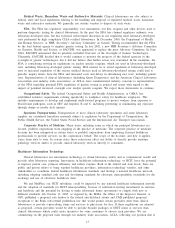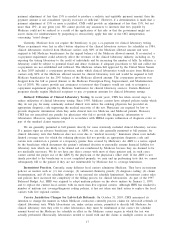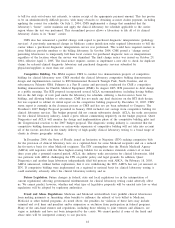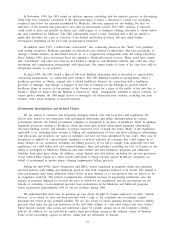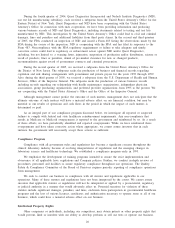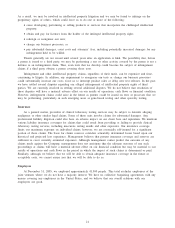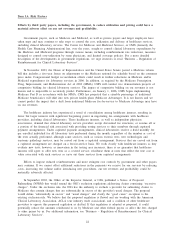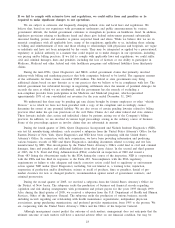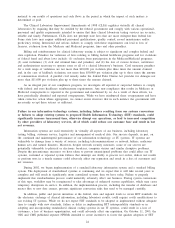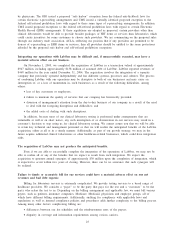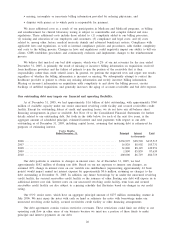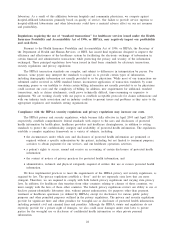Quest Diagnostics 2005 Annual Report Download - page 35
Download and view the complete annual report
Please find page 35 of the 2005 Quest Diagnostics annual report below. You can navigate through the pages in the report by either clicking on the pages listed below, or by using the keyword search tool below to find specific information within the annual report.to bill for such out-of-area test referrals, to ensure receipt of the appropriate payment amount. This has proven
to be an administratively difficult process, with many obstacles to obtaining accurate claims payment, including
applying the correct fee schedule. On July 1, 2004, CMS implemented a change that mandated that the
laboratory’s “home’’ carrier maintain and apply the clinical laboratory fee schedule applicable to the carrier
region where the test was performed. This streamlined process allows a laboratory to file all of its clinical
laboratory claims to its “home’’ carrier.
CMS also has announced a parallel change with regard to purchased diagnostic interpretations (pathology
services). A previously announced change in Medicare carrier jurisdiction rules required laboratories to bill the
carrier where a purchased diagnostic interpretation service was performed. This would have required carriers to
issue Medicare provider numbers to the billing laboratory. In October 2004, CMS posted a “change notice’’
permitting laboratories to temporarily bill their local carriers for purchased diagnostic tests or interpretations
regardless of the location where the service was furnished. The final change notice was issued on October 29,
2004, effective April 1, 2005. The final notice requires carriers to implement a new edit to check for duplicate
claims for referred clinical diagnostic laboratory and purchased diagnostic services submitted by
physicians/suppliers to more than one carrier.
Competitive Bidding. The MMA requires CMS to conduct two demonstration projects of competitive
bidding for clinical laboratory tests. CMS awarded the clinical laboratory competitive bidding demonstration
design and implementation contract to RTI International, Research Triangle Park, North Carolina, and its
subcontractor, Palmetto GBA. Palmetto is a Part B carrier and previously conducted for CMS a competitive
bidding demonstration for Durable Medical Equipment (DME). In August 2005, RTI presented its draft design
at a public meeting. The RTI proposal incorporated several ACLA recommendations, including having bidders
bid on the full range of tests paid under the laboratory fee schedule, utilizing a fee-for-service basis for
bidding, and allowing bidders to subcontract. CMS has not made any final decisions on the RTI draft design,
but was required to submit its initial report on the competitive bidding proposal by December 31, 2005. CMS’
status report is currently in the clearance process at CMS and has not yet been submitted to Congress. The
President’s 2007 Budget Proposal presented in January 2006 included cost savings from competitive bidding for
clinical laboratory services. The budget proposal did not contain substantive details. ACLA, the trade association
for the clinical laboratory industry, issued a press release commenting negatively on the budget proposal. Quest
Diagnostics and ACLA will monitor the design and implementation phase of the competitive bidding pilot and
the Congressional reaction to the 2007 budget proposal. The diagnostic testing industry is concerned that the
competitive bidding demonstrations or nation-wide expansion of competitive bidding will not take into account
all of the factors involved in the timely delivery of high quality clinical laboratory testing to a broad range of
clients in diverse geographic settings.
In December 2004, the State of Florida issued an Invitation to Negotiate (ITN) seeking competitive bids
for the provision of clinical laboratory tests on a capitated-basis for some Medicaid recipients and on a reduced
fee-for-service basis for other Medicaid recipients. The ITN contemplates that the Florida Medicaid Agency
(AHCA) will negotiate with the three highest-scoring bidders for an exclusive statewide contract of at least
three years plus a potential renewal period. ACLA, the industry trade association for clinical laboratories, filed
two petitions with AHCA challenging the ITN on public policy and legal grounds. In addition, Quest
Diagnostics and another large laboratory independently filed bid protests with AHCA. On February 18, 2005,
AHCA announced, without further explanation, that it was withdrawing the ITN. AHCA has not yet reissued its
ITN. If competitive bidding were implemented on a regional or national basis for clinical laboratory testing, it
could materially adversely affect the clinical laboratory industry and us.
Future Legislation. Future changes in federal, state and local regulations (or in the interpretation of
current regulations) affecting governmental reimbursement for clinical laboratory testing could adversely affect
us. We cannot predict, however, whether and what type of legislative proposals will be enacted into law or what
regulations will be adopted by regulatory authorities.
Fraud and Abuse Regulations. Medicare and Medicaid anti-kickback laws prohibit clinical laboratories
from making payments or furnishing other benefits to influence the referral of tests billed to Medicare,
Medicaid or other federal programs. As noted above, the penalties for violation of these laws may include
criminal and civil fines and penalties and/or suspension or exclusion from participation in federal programs.
Many of the anti-fraud statutes and regulations, including those relating to joint ventures and alliances, are
vague or indefinite and have not been interpreted by the courts. We cannot predict if some of the fraud and
abuse rules will be interpreted contrary to our practices.
18


